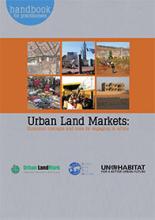Land Library
Bienvenue dans la bibliothèque du Land Portal. Explorez notre vaste collection de ressources en libre accès (plus de 74 000), comprenant des rapports, des articles scientifiques, des articles de recherche, des publications évaluées par des pairs, des documents juridiques, des vidéos et bien plus encore.
/ library resources
Showing items 37 through 45 of 63.Countries in the Latin America and Caribbean region were the first in the developing world to go through rapid urbanization.
This paper explores, conceptually and empirically, the question of how much food is produced by women. Data for labour inputs and agricultural output are used to assess women’s contribution to food and agricultural production. The study also assesses gender differences in productivity.
Post-conflict northern Uganda has witnessed an increase in disputes over land. This has, to a great extent, been as a result of the armed conflict and its aftermath.
This Handbook introduces key economic and related concepts explaining the functioning of urban land markets. You will find in this Handbook tools for engaging in a critical analysis of conventional economics, particularly in the understanding of how African urban land markets work.
Northern Uganda is the scene of one of the world’s most volatile and spontaneous processes of reintegration.
Over 80% of all land in Uganda is held under unregistered ‘customary tenure’. This means that it is private property, but the owners need no documents to prove ownership.
Tenure in Mystery collates information on land under conservation, forestry and mining in the Karamoja region.
Property rights economically empower women by creating opportunities for earning income, securing their place in the community and ensuring their livelihoods. When women are economically empowered, it spurs development for their families and communities.
The protection given to the land rights of women, orphans and any other vulnerable groups in Northern and Eastern Uganda is probably as good as can be found anywhere in the world. Customary land law is based on three main principles.






